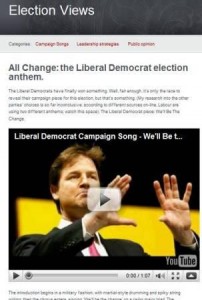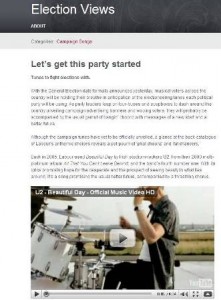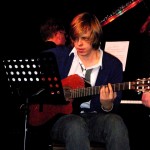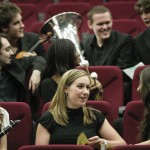‘Gilded Lily: Allen wooed by Left and Right’ has been published on ‘Election Views’ recently.

Click here to read the post.
The philosophy of music: or the music of philosophy ?
‘Gilded Lily: Allen wooed by Left and Right’ has been published on ‘Election Views’ recently.

Click here to read the post.
Legendary Canadian songstress Joni Mitchell has had a pop at equally legendary musician Bob Dylan for being a fake.
As revealed in the media yesterday, Mitchell has declared Dylan ‘a plagiarist’ and says ‘Everything about Bob is a deception.’
 Of course, those who live in the glare of publicity always have an element of deception about them, creating a public persona behind which to shelter themselves from the media’s remorseless stare. As the great French poet Jean Cocteau famously declared, ‘I am a lie who always speaks the truth.’
Of course, those who live in the glare of publicity always have an element of deception about them, creating a public persona behind which to shelter themselves from the media’s remorseless stare. As the great French poet Jean Cocteau famously declared, ‘I am a lie who always speaks the truth.’
Dylan, it seems, has been accused of plagiarism before, connected with his 2006 album Modern Times.
Both Mitchell and Dylan have changed their names, but obviously Mitchell did not take kindly to the comparison in her interview with the Los Angeles Times.
However, Mitchell also pours scorn on Madonna, whom, she says, marks a turning-point in American culture which has been ‘stupid and shallow since 1980.’ Bear in mind, however, that this was the decade that gave film Oliver Stone’s Platoon (1986), and literature Tom Wolfe’s classic Bonfire of the Vanities, (1987), as well as the photography of Cindy Sherman, to name but a few redeeming cultural icons.
There was blood on Mitchell’s career tracks in the 1980s, when her career took something of a dive after her success in the 70s: it was only with Night Ride Home in 1991 that her career surged back to critical acclaim. Perhaps that’s what it’s all about, really….
Although anyone who can list Court and Spark, The Hissing of Summer Lawns and Hejira amongst their back catalogue deserves our respect.
As usual, the arts have become a political football in the run-up to the election, with each party avowing its commitment to the arts and its funding in one way or another.
If, like me, you’re interested in the future of the arts, with its implications for which way you might be planning to vote next month, then this will be useful to you: Tom Service, music critic for ‘The Guardian‘ and broadcaster for Radio 3, recently interviewed on-air the Culture Secretary from each of the three main parties.
There is a concise summary of his interview on his blog here, plus a link to the programme which will be available on iPlayer until Saturday.
Interesting stuff…
 I’m pleased to say my second guest post for ‘Election Views’ has been published this morning.
I’m pleased to say my second guest post for ‘Election Views’ has been published this morning.
It’s a brief look at the Liberal Democrat Party’s election campaign song, with a bit of Beethoven and Dr. Who thrown in as well.
And before you ask, I’m not sure why, either: it was just going that way…
Click here to read the post.

I’m delighted to have been invited to launch the University’s new ‘Election Views’ blog with its first post.
The new blog is kick-started by ‘Let’s Get This Party started,’ a look back at some of the Labour Party’s campaign music choices, whilst we all nervously wait for this season’s tunes-tastic selections to be announced.
There’ll be a follow-up post when all the musical choices have been announced.
Click here to read the post.
The full, commercial horror of the Lloyd Webber / Graham Norton Juggernaut has finally struck me this week.
Following on from the success of ‘How do you solve a problem like Maria ?’ in 2006, where young hopefuls competed on national television to take the role of Maria, the series ‘Who will be the next worthy Dorothy ?’ (or something similar) is currently in full flight (‘Over the Rainbow’ – see what they did there ?), with similar youngsters competing to be the next Dorothy in the forthcoming Lloyd Webber-backed Wizard of Oz.

When The Sound of Music opened, I’m sure a lot of people flocked to the show, in order to see in the flesh the former call-centre girl, Connie Fisher, who won the television contest and became Maria in the production. The television programme regularly attracted around six million viewers each week. There’s a real fascination in seeing people live that you’ve seen on television: the same phenomenon surrounded the RSC production of Hamlet in 2008, in which David Tennant was playing the Dane, fresh from saving the universe each week as Doctor Who.
You can see a pattern emerging here: the series isn’t about television entertainment, or the chance for one young wannabee to be rescued from obscurity and cast into a glittering and well-deserved career. It’s not even about giving the national population some input into the show (viewers can vote for their own favourite in the form of a ‘wild card,’ voting to rescue a contestant who has been knocked out by the panel of judges).
No: it’s about cashing in on the tie-in between the hysteria surrounding the show and the lucrative ticket sales that will be generated by the theatre show following on from the television series. It’s all faintly nauseating: Lloyd Webber sitting on a golden throne like some sort of benevolent deity, tearful young girls earnestly describing their commitment to the show: ‘We eat, breathe and sleep Dorothy all the time now,’ gushed one contestant recently. The Sound of Music opened scarcely four weeks after Fisher won the series: hype needs to be translated into ticket sales quickly, or the momentum is lost.
And before anyone leaps up to reach through the screen and poke me in the eye, yelling ‘It’s just television: it’s just entertainment!’ I know it is: Saturday night television along the lines of X Factor, Pop Idol or Strictly Come Dancing is at its heart just entertainment. But there’s perhaps a cynical cashing-in by the ‘Dorothy’ series that leaves a bitter taste in the mouth.
In fairness, though, 14 pence from each telephone vote is going to a fund to support the arts.
Cynical hype-to-cash-generating merry-go-round, or top television entertainment: where do you stand on it all ?
 I”m delighted to announce that the most recent Jazz @ 5 has been reviewed on the LondonJazz blog, one of the top ten London blogs and a mecca for jazz-enthusiasts.
I”m delighted to announce that the most recent Jazz @ 5 has been reviewed on the LondonJazz blog, one of the top ten London blogs and a mecca for jazz-enthusiasts.
Run by Sebastian Scotney, the jazz critic for the Daily Telegraph, the review is penned by Adam Tait, and highlights the nature of what Jazz @ 5 is really all about. Click here to read the review.
Congratulations to everyone who has helped make Jazz @ 5 a success again this year: bring on the next one!
This Friday sees ‘Music Matters’ launch its new series profiling musical alumni from the University of Kent.

Each week will feature an interview with former students who were involved in music-making at the University, from soloists to orchestral-players, Chamber Choir members and conductors, and Music Society committee members.
It promises to be an exciting odyssey, and a chance to visit some old friends.
Make sure your RSS feeders are primed to deliver them direct to your desktop by clicking on the blue feed-link at the top of your screen!